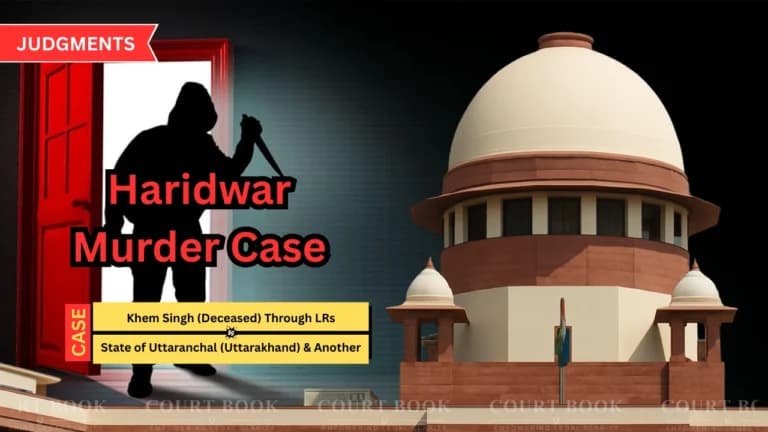The Supreme Court of India, in a significant ruling, has permitted the substitution of the deceased appellant’s son to continue pursuing a criminal appeal arising from a 1992 murder case in Haridwar.
Case Background
The case traces back to December 9, 1992, when Tara Chand (informant), his brother Virendra Singh, and his son Khem Singh were attacked in Haridwar. Armed with guns and sharp weapons, the accused Ashok, Pramod, and Anil alias Neelu assaulted them, leading to the death of Virendra Singh and injuries to others. A case was registered under various sections of the IPC, including 302 (murder), 307 (attempt to murder), 452, and 326.
In 2004, the Sessions Court convicted the accused, awarding life imprisonment and fines. However, in 2012, the Uttarakhand High Court overturned the conviction and acquitted them, which led Khem Singh to file an appeal in the Supreme Court.
Khem Singh passed away during the pendency of the appeals, after which his son Raj Kumar, also injured in the incident, sought substitution to continue the case.
The central question before the Supreme Court was whether a legal heir of a victim, who had filed an appeal under Section 372 CrPC, could continue the proceedings after the original appellant’s death.
Read also:- Parliament Passes Income-Tax Act, 2025 to Replace Six-Decade-Old Law
The respondents opposed the substitution, arguing that under Section 394 CrPC, appeals abate with the appellant’s death, except in cases involving a convicted accused.
Justice B.V. Nagarathna, delivering the judgment, emphasized the intent behind the 2009 amendment to Section 372 CrPC, which provided victims and their heirs the right to appeal against acquittals.
The Court clarified:
“The right to prefer an appeal also includes the right to prosecute it. Denying substitution would defeat the very purpose of the proviso to Section 372 CrPC.”
The Court also relied on past rulings, including Mallikarjun Kodagali v. State of Karnataka (2019) and the Constitution Bench decision in PSR Sadhanantham v. Arunachalam (1980), affirming that victims’ rights must be interpreted broadly to ensure justice.
Read also:- Rajasthan High Court Upholds Execution Order, Allows Restoration of Possession in Decade-Old Land Dispute
The Supreme Court allowed Raj Kumar to substitute his deceased father, Khem Singh, as appellant. The Court set aside the abatement, condoned the delay in filing substitution applications, and directed the appeals to be heard on merits.
This ruling strengthens the rights of victims and their heirs to pursue justice, even when the State chooses not to file an appeal against acquittals.
Case Title: Khem Singh (Deceased) Through LRs vs. State of Uttaranchal (Now State of Uttarakhand) & Another
Jurisdiction: Criminal Appellate Jurisdiction
Case Numbers: Criminal Appeal Nos. 1330-1332 of 2017
Citation: 2025 INSC 1024
Date of Supreme Court Judgment: 2025 (Reportable date of judgment)














